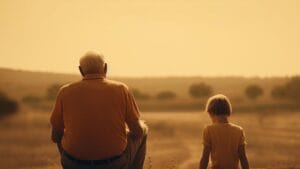Introduction: Why The Book Thief Stands Out
The Book Thief by Markus Zusak is a novel that many people still talk about, even years after it was first published. It tells a story from World War II, but it does not focus on soldiers or battles. Instead, it shows how regular people lived during that time, especially one young girl.
What makes this book different is that the story is told by Death. It sounds strange at first, but it works well. Death is not scary here. It is thoughtful, sometimes even gentle. It gives the story a unique point of view.
What Happens in The Book Thief ?
The Book Thief by Markus Zusak tells the story of a young girl named Liesel Meminger growing up in Nazi Germany during World War II. The novel is narrated by Death, who watches over humans and is particularly drawn to Liesel’s story. Through Death’s eyes, we see a world filled with pain, love, fear, and survival—and how a girl finds power in words during one of history’s darkest times.
Main Characters in The Book Thief by Markus Zusak
1. Liesel Meminger
Liesel is the main character in The Book Thief by Markus Zusak. She is a young girl who is sent to live with a foster family in Germany during the war. Her life is full of pain—she loses her brother and her mother—but she slowly finds comfort in books and the people around her.
She learns how to read with the help of her foster father. She also starts to steal books, not for fun, but because books become very important to her. They help her make sense of a difficult world.
2. Hans Hubermann
Hans is Liesel’s foster father. He is kind and patient. He teaches Liesel to read and always makes her feel safe. He is not a loud or powerful man, but he does brave things in quiet ways. He even hides a Jewish man in his basement, risking his own life.
Hans is one of the most loved characters in The Book Thief book because of his honesty and gentle nature.
3. Rosa Hubermann
Rosa is Liesel’s foster mother. She often seems angry and harsh. She yells a lot and uses strong language. But as the story goes on, readers see that she also cares deeply about her family. She shows love in her own way, through her actions more than her words.
4. Rudy Steiner
Rudy is Liesel’s best friend. He is funny, smart, and loyal. He often says he wants a kiss from Liesel, but their friendship is about more than that. He supports her in every situation. Rudy’s story is both fun and sad, and many readers remember him as one of the most touching parts of the book.
5. Max Vandenburg
Max is the Jewish man who hides in the Hubermanns’ basement. He becomes very close to Liesel. They share stories, dreams, and a deep understanding of what it means to lose something. Max is quiet but strong, and his friendship with Liesel adds a lot of emotion to the story.
Summary of The Book Thief by Markus Zusak
Liesel’s Journey Begins
The story starts in 1939. Liesel, only nine years old, is traveling by train with her mother and younger brother. Tragically, her brother dies on the journey and is buried by the tracks. At his gravesite, Liesel finds a book dropped by one of the gravediggers. She picks it up—The Grave Digger’s Handbook. Though she can’t read, this small act becomes her first step into the world of books and words. It’s also the moment she becomes “the book thief.”
Soon after, Liesel is sent to live with foster parents in a small town called Molching, near Munich. Her mother, facing political danger for being a communist, can no longer care for her. Liesel is placed with Hans and Rosa Hubermann, who live on Himmel Street. Her new life begins here, in a quiet neighborhood that will later become the heart of the story.
New Home, New Life
Hans Hubermann, Liesel’s foster father, is a kind and gentle man who plays the accordion and works as a house painter. He becomes Liesel’s greatest comfort. He sits with her at night when she wakes from nightmares and slowly teaches her how to read using The Grave Digger’s Handbook.
Rosa Hubermann, her foster mother, is loud, rough around the edges, and often angry. But under her tough exterior, Rosa deeply cares for her family. Though she constantly shouts and scolds, she shows her love through action—keeping the family together and protecting Liesel as if she were her own.
Liesel also meets Rudy Steiner, her curious and spirited next-door neighbor. Rudy is smart, athletic, and always asks Liesel for a kiss. Their friendship grows quickly, full of play, teasing, and small acts of rebellion. Together, they share many moments that bring light to the dark world they live in.
The Power of Words
As Liesel learns to read, she becomes obsessed with books. But during wartime, books are hard to find and often burned. That doesn’t stop her. Liesel begins to steal books—from Nazi book burnings, from the mayor’s library, and wherever she can find them. That’s how she earns her name: The Book Thief.
Reading becomes more than a skill for her. It becomes a way to survive. Words give her comfort when everything else feels uncertain. They also help her understand the world. She sees how Nazi Germany uses words to control people, but she also learns how words can connect, heal, and give hope.
One of the places where she gets books is the home of Ilsa Hermann, the mayor’s wife. Liesel starts by delivering laundry to her, but later begins sneaking into her library. Surprisingly, Ilsa allows it—understanding that books are one of the few things that bring Liesel joy.
A Stranger in the Basement
One night, the Hubermanns take in a secret guest—Max Vandenburg, a young Jewish man. Max is the son of a man who once saved Hans’s life during World War I. Hans feels it’s his duty to protect Max, even though it’s extremely dangerous. Hiding a Jew in Nazi Germany is a crime that could get the whole family killed.
Max lives in their cold, dark basement, hidden from the world. Slowly, he and Liesel form a deep friendship. They both have nightmares. They both feel like outsiders. They bond over words, stories, and the pain of losing family. Max writes small books just for Liesel—beautiful, handmade stories full of drawings and thoughts.
Their bond becomes one of the most powerful parts of The Book Thief by Markus Zusak. Even though Max cannot leave the basement, his presence brings meaning to Liesel’s life.
The War Gets Closer
As the war grows worse, life in Molching becomes harder. Food is scarce. People live in fear. The town experiences more air raids, and Liesel and her neighbors often run to underground shelters.
During these moments of fear, Liesel brings her books and reads aloud to the people in the shelter. Her voice calms them. Her words bring peace, even if only for a little while. This shows how powerful stories can be—how they can give people strength even in the face of bombs and destruction.
One day, Hans makes a mistake. He helps a Jewish man who is struggling in public—offering him a piece of bread. Though it’s an act of kindness, the Nazis punish Hans. He is drafted into the army and sent to fight. The family is left struggling without him, and Rosa becomes even more stern. Liesel misses Hans terribly and writes letters to him.
Eventually, the Hubermanns are forced to send Max away for safety. Liesel is heartbroken but understands. She never forgets him and wonders every day where he is—or if he’s even alive.
Everything Changes on Himmel Street
The most heartbreaking moment in The Book Thief by Markus Zusak comes near the end. One night, without warning, a bomb hits Himmel Street. Liesel is in the basement, writing in her notebook—her own story—when the explosion destroys the street and kills almost everyone she loves: Hans, Rosa, Rudy, and many of her neighbors.
Liesel walks through the wreckage in shock. She kisses Rudy’s dead lips, finally giving him the kiss he always wanted. She clutches her notebook—The Book Thief—the story of her life.
This is where Death, the narrator, finds the notebook and takes it with him. He is touched by Liesel’s story, and even though he sees death every day, her life makes him pause. He says he is “haunted by humans”—a line that stays with many readers long after finishing the book.
Life After the War
After the bombing, Liesel is taken in by Ilsa Hermann, the mayor’s wife. She slowly begins to heal. Then, one day, Max returns—alive. Their reunion is quiet but full of feeling. They don’t need to say much. Their eyes tell the whole story. Despite everything, they survived.
Years later, Liesel grows old, has a family, and lives a full life. When she dies, Death carries her soul and shows her the notebook—the story she wrote all those years ago. Her story becomes a reminder that even in the worst times, kindness, love, and words can still shine through.
Major Themes in The Book Thief by Markus Zusak
1. The Power of Words
One of the biggest themes in The Book Thief is how powerful words can be. Liesel learns that words can bring comfort, tell stories, and even change the way people think. At the same time, the book also shows how words can be dangerous—used by the Nazis to spread hate. The Book Thief by Markus Zusak shows us both sides. Words can destroy, but they can also heal.
2. Loss and Survival
Loss is everywhere in The Book Thief book. Liesel loses her brother, her mother, her friends, and her entire neighborhood. Yet through it all, she keeps going. The book teaches us that even in terrible times, people can survive—not just physically, but emotionally and spiritually. Liesel’s strength becomes a quiet reminder of human resilience.
3. Friendship and Love in Hard Times
In a world filled with fear and war, The Book Thief by Markus Zusak gives us moments of kindness and love. The friendship between Liesel and Rudy, the bond between Liesel and Max, and the quiet, caring love from Hans and Rosa all show that love still exists—even during war. These relationships are the heart of the story.
4. Death as a Witness, Not a Monster
One of the most unique things about The Book Thief is its narrator: Death. But Death isn’t evil or cruel. Instead, Death is thoughtful, even tired. He watches humans and is often confused and moved by them. In The Book Thief by Markus Zusak, Death teaches us that mortality is a part of life, not just the end of it.
Takeaways from The Book Thief
Stories Matter
Books are more than pages. They’re lifelines. They keep people connected. When Liesel reads during the air raids, it brings peace to frightened neighbors. When Max writes little stories for Liesel, it helps them both survive. The Book Thief book tells us stories are a kind of power—especially when everything else is falling apart.
You Can Keep Going
Even when everything seems lost, like when Liesel loses her family, life continues. Her pain doesn’t disappear, but she finds a way forward. This book reminds us that we’re stronger than we think.
Small Acts Matter
Helping a stranger, sharing a book, reading to others—these small actions carry great meaning in The Book Thief by Markus Zusak. They show that people can still choose kindness, even in the worst times.
Conclusion
Reading The Book Thief by Markus Zusak is an experience that stays in your heart. It doesn’t rely on loud drama or perfect heroes. Instead, it gives us real people trying to live in an impossible world. Liesel is not a warrior or a rebel—she’s just a girl who learns to read, who steals books, and who learns how much words matter.
This book teaches us to value books, friendship, and the quiet courage it takes to be kind. Through its pages, we remember that stories can save us, even when the world seems broken.
In the end, The Book Thief book is not just about a girl or a war. It’s about humanity—in all its messy, loving, and fragile forms. It shows that even when Death is watching, life can still be beautiful.
Must Read:




